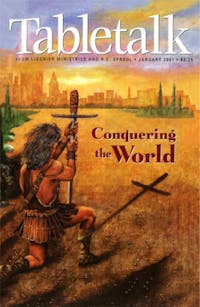
Request your free, three-month trial to Tabletalk magazine. You’ll receive the print issue monthly and gain immediate digital access to decades of archives. This trial is risk-free. No credit card required.
Try Tabletalk NowAlready receive Tabletalk magazine every month?
Verify your email address to gain unlimited access.
Whenever we think about the kingdom of God—such as when we pray the Lord’s Prayer, asking for the kingdom to “come”—a host of theological questions cluster around. What do we mean by “the kingdom”? And how is it brought about? The kingdom refers to the rule and realm of Jesus Christ, which, of course, encompasses all things. However, as good as this sounds on paper, the potential applications can start making us a little nervous. Those who talk about some kind of actualized kingdom sometimes frighten their Christian brothers and sisters with visions of evangelical ayatollahs trying to find a witch to burn by using homemade holy dice. But the opposite of this is no better. To claim that the authority of Jesus Christ is always invisible and “heavenly,” or that it is somehow mystically, vaporously, “within,” is little more than refried gnosticism. Jesus Christ is Lord, not only of spiritual things but also of kings, presidents, art galleries, roly-poly guys, seraphim, buttercups, schools, and all things in between.
The neo-gnostics want to assert that Jesus Christ is technically Lord of all things, but that this does not make any visible difference in the “earthly” realm, the realm of matter. And our activist brethren want to storm city hall and send lobbyists to the District of Columbia to “make a difference.” When they all get there, they employ the same methods used by Big Tobacco, with about the same results.
There is another way, and this is to recover an understanding of the centrality (and potency) of true worship. The worship of the church, rightly understood, is warfare. Unbelief has no effective means of resisting. This is because “the weapons of our warfare are not carnal but mighty in God for pulling down strongholds, casting down arguments and every high thing that exalts itself against the knowledge of God, bringing every thought into captivity to the obedience of Christ” (2 Cor. 10:4–5). This is what our weapons do. But what are these weapons?
When the history of redemption is finally and completely written, we will find that the world was conquered in the name of Jesus Christ by means of the Holy Spirit empowering words, water, bread, and wine. The church, functioning as the church, in her identity as the church, will, in her meekness, inherit the earth. God “put all things under [Christ’s] feet, and gave Him to be head over all things to the church, which is His body, the fullness of Him who fills all in all” (Eph. 1:22–23). God receives all glory through Jesus Christ throughout all human history, world without end, and He does so “in the church” (Eph. 3:21). Everything belongs to us, the church, and this includes the world, life, death, the present, and the future (1 Cor. 3:21–23). All authority in heaven and on earth has been given to Jesus Christ. Therefore, we are to disciple the nations. The title deed to the world is in the hand of Jesus Christ. But the hand of Jesus Christ is part of His body—and we are that body.
God gave Canaan to Abraham, but the sons of Abraham had to take it. In the same way, God has given all the nations of men to Christ as His inheritance (Ps. 2), and Christians are called to manifest the reality of that reign in the world. The nations are discipled through being told that the authority of Jesus Christ already includes them. They are then baptized and instructed in that baptism.
So the world is not conquered with a sword. The instruments of conquest, the weapons of our warfare, are Word and sacrament. The worship of the church is not a religious meeting in a room, with the assembled seeking to escape from the world outside. Neither is the church an army organized along the same lines used by the benefactors of the Gentiles. We have a battering ram about which the lords and princes of this world know nothing, and every Lord’s Day we take another swing at their gates with it.
We do this as we sit at the table that He has prepared for us in the presence of our enemies. Hearing the Word preached, the church is hearing the terms of conquest. The church at the Lord’s table is the church ruling. “ ‘And I bestow upon you a kingdom, just as my Father bestowed one upon Me, that you may eat and drink at My table in My kingdom, and sit on thrones judging the twelve tribes of Israel’ ” (Luke 22:29–30; Matt. 19:28).
This is because Christ “has made us kings and priests to His God and Father” (Rev. 1:6). We are not kings and priests in the same way that a middle-aged businessman is the poobah of some fraternal order. Neither are we kings and priests in the way that earthly rulers with real physical power are kings and priests. We are kings and priests by virtue of our identity with Christ, who is the great king and the only priest.
This is why our weapons are not carnal. And this is why there are no countermeasures.
